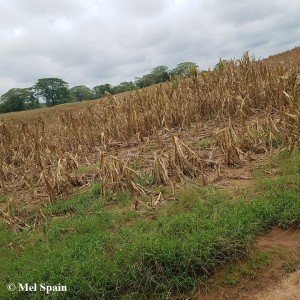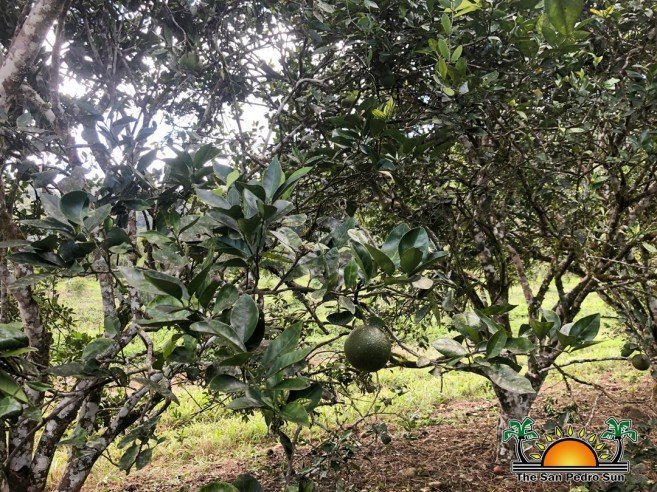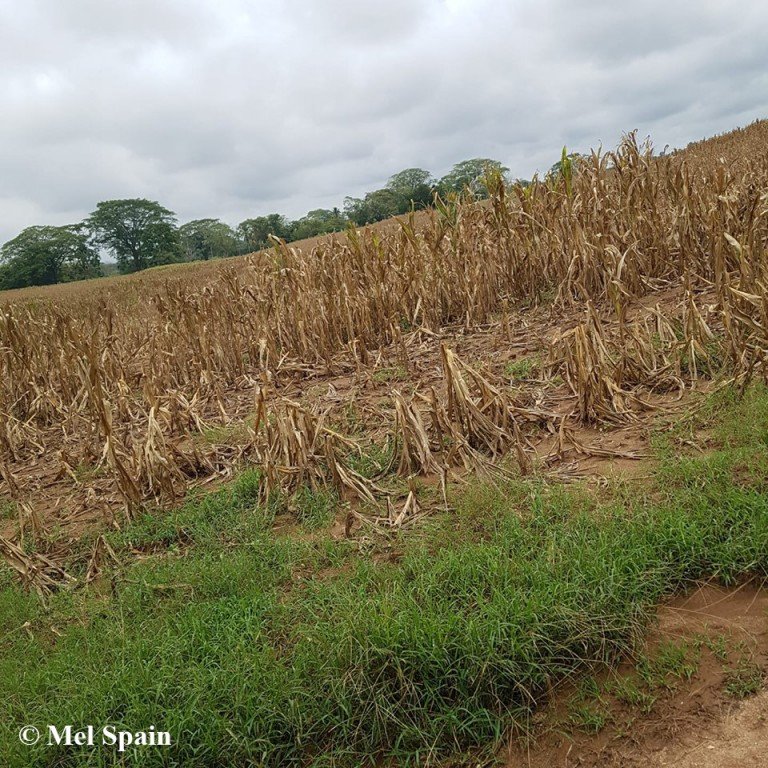 Belizean farmers’ crop losses due to the prolonged drought are estimated at $50 million, prompting the Government of Belize (GOB) to declare a partial State of Emergency for the affected districts, declared Prime Minister Hon. Dean Barrow at a press conference at the Radisson Fort George Hotel in Belize City on Thursday, September 19th.
Belizean farmers’ crop losses due to the prolonged drought are estimated at $50 million, prompting the Government of Belize (GOB) to declare a partial State of Emergency for the affected districts, declared Prime Minister Hon. Dean Barrow at a press conference at the Radisson Fort George Hotel in Belize City on Thursday, September 19th.
Barrow said GOB would be consulting with international funding institutions such as the World Bank, the Inter-American Development Bank, the Caribbean Development Bank, the International Fund for Agricultural Development (IFAD) and other international partners to identify funding to provide financial support to farmers in the Belize, Cayo, Corozal, Orange Walk, and Stann Creek districts to help them replant and invest in  irrigation equipment to help them get over this natural disaster which has befallen them. At present, GOB expects to access a loan of $1 million to help.
irrigation equipment to help them get over this natural disaster which has befallen them. At present, GOB expects to access a loan of $1 million to help.
The funds are to be disbursed through the Development Finance Corporation based on recommendations and assessments done by the Ministry of Agriculture to help farmers and ranchers in need to buy seeds, fertilizer, feed for livestock. GOB will also offer tax and duty exemptions on imports for the agricultural sector, including seeds, fertilizers, chemicals and equipment such as pipes, water pumps and tanks, troughs and even generators to supply power to water pumps.
 Central Bank Governor Joy Grant explained that this support to the agricultural sector is important; since some $277 million are loans to the farming sector, about ten percent of all loans in the financial system and is important to the country’s economy. She said a new policy would be implemented in the interest of preserving Belize’s food security, allowing banks and other lending institutions to re-classify loans, extending the repayment period for agricultural loans, from six months to 18 months, and even to 24 months before the loans are classified as non-performing. The reclassification will allow banks to keep the loans on the books as viable, even though the loans may have been non-performing for up to 18 months. Therefore, farmers will have more time to repay their existing loans, be able to borrow to get a new crop into the ground and to re-equip themselves to cope with the new challenges of farming without the guarantee of rain. Grant said this reclassification became necessary because they consider loans to the farming sector as high risk considering the financial success of a crop can be affected by floods, drought, insect pests, diseases and other factors, market supply, and demand, etc.
Central Bank Governor Joy Grant explained that this support to the agricultural sector is important; since some $277 million are loans to the farming sector, about ten percent of all loans in the financial system and is important to the country’s economy. She said a new policy would be implemented in the interest of preserving Belize’s food security, allowing banks and other lending institutions to re-classify loans, extending the repayment period for agricultural loans, from six months to 18 months, and even to 24 months before the loans are classified as non-performing. The reclassification will allow banks to keep the loans on the books as viable, even though the loans may have been non-performing for up to 18 months. Therefore, farmers will have more time to repay their existing loans, be able to borrow to get a new crop into the ground and to re-equip themselves to cope with the new challenges of farming without the guarantee of rain. Grant said this reclassification became necessary because they consider loans to the farming sector as high risk considering the financial success of a crop can be affected by floods, drought, insect pests, diseases and other factors, market supply, and demand, etc.
Atlantic Bank manager Mrs. Sandra Bedran indicated the willingness of the commercial banks to work with the farmers to repay their  loans, by reducing interest rates. She said it was important for farmers to be able to market their produce and invest in agro-processing so they can increase their profits to earn a livelihood from their business. It is also important that as a country, we can feed ourselves and keep food imports to a minimum.
loans, by reducing interest rates. She said it was important for farmers to be able to market their produce and invest in agro-processing so they can increase their profits to earn a livelihood from their business. It is also important that as a country, we can feed ourselves and keep food imports to a minimum.
Minister of Agriculture Hon. Senator Godwin Hulse explained that through the new Belize Agriculture Information Management System (BAIMS), the ministry has been able to register approximately 7,098 farmers, with precise geographical positioning system (GPS) coordinates for 8,274 farms, even though many cane farmers in the north have been reluctant to register, and so the ministry’s information is not yet complete for the entire country. But the system allowed the ministry to assess the damage caused by the drought, and to get information on the areas where farmers need help.
 Hulse commented that although the Belize Cane Farmers Association has over 5,400 cane farmers on their books, less than half have registered with BAIMS. Even the Sugar Industry Management Information System administered by the Sugar Industry Research and Development Institute (SIRDI) and BSI/ASR have been unable to register all cane farmers. He encouraged cane farmers to come in and register; since when it comes to international funding agencies, the ministry will need to present accurate numbers of the farmers in need of help, and farmers will need to be registered with the ministry and BAIMS to qualify for assistance.
Hulse commented that although the Belize Cane Farmers Association has over 5,400 cane farmers on their books, less than half have registered with BAIMS. Even the Sugar Industry Management Information System administered by the Sugar Industry Research and Development Institute (SIRDI) and BSI/ASR have been unable to register all cane farmers. He encouraged cane farmers to come in and register; since when it comes to international funding agencies, the ministry will need to present accurate numbers of the farmers in need of help, and farmers will need to be registered with the ministry and BAIMS to qualify for assistance.
The ministry’s assessment of the cane damaged by drought is about 30%, and they anticipate a shortfall in cane production for the coming 2019-20 crop to about 900,000 tons of cane, significantly less than this year’s record crop of 1.3 million tons of cane delivered and milled. The decrease in sugar production will also impact the Belize economy in lower foreign exchange earnings.
The drought has severely impacted corn production, Hulse said. In the Cayo District, there were 14,817 acres damaged, where the yield will be only 2,000lbs per acre when it would normally be about 5,000lbs per acre. Another 2,300 acres of corn in Cayo was completely lost. Corozal suffered a complete loss of 4,200 acres of yellow corn, their entire production, and another 1,900 acres of white corn. Orange Walk farmers also lost all 1,900 acres of yellow corn planted. Hulse said this would not cause any immediate shortages since Belize had a significant amount of corn already stored from the previous crops, but the shortfall would hurt the corn exports, in which Belize had been doing so well.
Soybean production will also be affected, and this will affect poultry production since soybean meal is in chicken feed, and the soybean oil exported to Jamaica. Cattle were also affected by the drought as the shortage of water and grass has caused an average weight loss of about 50lbs per head. The timing is unfortunate as Belize in the process of meeting all the phytosanitary and agricultural health requisites for Belize to export live cattle to Mexico. GOB is still in the process of formalizing this legal trade of cattle into Mexico, whereby cattle farmers will be able to get a better price, rather than by the informal trade where cattle are smuggled across the border into Guatemala and subsequently sold to Mexico.
Some 816 small farmers with some 900 acres under cultivation in the four districts were affected as well. Citrus in Stann Creek and Cayo districts was also affected to a certain degree since with less rain; the fruit was smaller with less juice. On a positive note, Hulse said production of red kidney beans, rice, and potatoes were unaffected.




